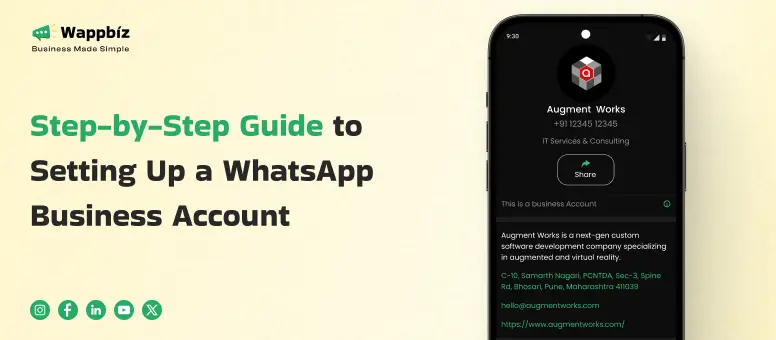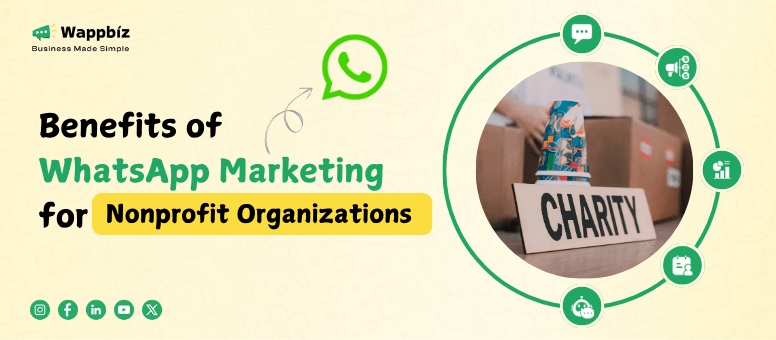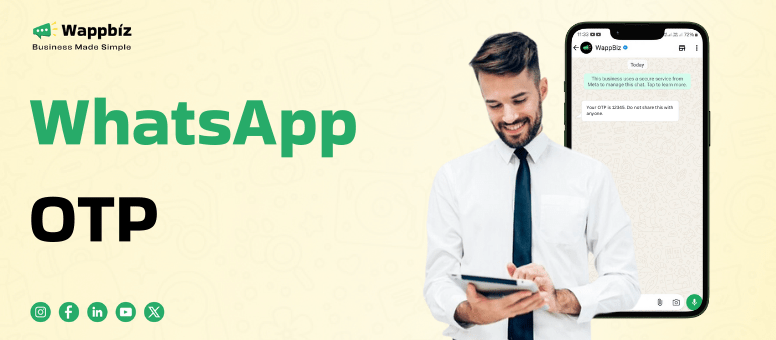If you’ve ever thought about connecting with your customers quickly and personally, WhatsApp is likely one of the first platforms that comes to mind. With over 2 billion users worldwide, it’s a powerful tool for communication. But did you know that there’s a version specifically designed for businesses? That’s where the WhatsApp Business Account comes in, giving you a professional way to interact with your customers and manage your business communication seamlessly.
What is a WhatsApp Business Account?
A WhatsApp Business Account is a specialized account designed to help businesses of all sizes connect with their customers more efficiently. Unlike the standard WhatsApp account, this version comes loaded with features that are specifically tailored to business needs. You can create a detailed business profile, automate messages, and organize your conversations—all from within the app. Whether you’re a small business owner or managing a larger operation, it’s an essential tool for building customer relationships and delivering excellent service.

How to Make a WhatsApp Business Account?
Setting up a WhatsApp business account is simple and takes just a few minutes. Follow these steps to get started:
Step 1: Download the WhatsApp Business App
- Download the app from your smartphone’s app store (available for both Android and iOS). Make sure you select the WhatsApp Business App, not the standard version, to access professional features.
Step 2: Set Up Your Business Number
- Open the app and verify your phone number. It’s recommended to use a separate number for business purposes to keep your personal and professional communications distinct.
- Enter the business number and verify it using the one-time code sent to your phone. If you’re using a number from a personal WhatsApp, you can migrate your chat history to the business app.
Step 3: Complete Your Business Profile
- Fill out your business profile to establish trust with customers:
- Business Name: Use your official name for recognition.
- Business Category: Select the most relevant category (e.g., retail, restaurant, service provider).
- Description: Write a brief overview of your business.
- Contact Information: Add your address, website, and email for easy customer access.
- Business Hours: Specify when you’re available to respond.
- A complete profile helps customers recognize and trust your business.
Step 4: Customize Your Messaging
- Set up automated messages to enhance the customer experience:
- Greeting messages: Welcome new customers with an automated message when they reach out.
- Away messages: Inform customers when you’re unavailable.
- Quick Replies: Save shortcuts for frequently asked questions or responses, helping manage multiple conversations efficiently.
- These features ensure customers receive timely and relevant information, even when you’re busy.
Step 5: Explore Additional Features
- Catalog Setup: Showcase your products directly in the app.
- Labels for Organization: Sort conversations by categories like “new order” or “follow-up needed” to stay organized.
- Analytics Tools: Monitor metrics like message delivery and response rates to refine your strategy based on performance.
Step 6: Start Connecting with Customers
- Promote your WhatsApp number on your website, social media, and business cards. Engage with customers professionally, provide timely responses, and build a loyal customer base.
Setting up a WhatsApp business account is quick and easy, unlocking numerous possibilities for your business. With features that streamline communication, automate responses, and showcase products, it’s a must-have tool for engaging customers personally and efficiently. Download the app today and discover how WhatsApp can transform your business communication!
Why Did WhatsApp Ban My Business Account?
If your WhatsApp business account has been banned, it’s important to understand the reasons and take the necessary steps to prevent it in the future. Below are some common reasons for account bans, how to avoid them, and what to do if your account gets banned:
- Violation of WhatsApp’s Terms of Service
- What It Is: Engaging in activities like spamming, sending bulk messages without consent, or using unauthorized software.
- Why It Matters: WhatsApp monitors accounts to prevent disruptive or abusive behavior that violates their terms of service.
- Use of Unauthorized Tools or Automation
- What It Is: Using third-party automation tools or bots that aren’t approved by WhatsApp. Only official APIs, like the WhatsApp Business API, are allowed for message automation.
- Why It Matters: Unauthorized tools can compromise security and disrupt the platform, leading to account bans.
- Reports from Users
- What It Is: If customers report your business account for spam, inappropriate behavior, or irrelevant content, WhatsApp may investigate.
- Why It Matters: A high number of user reports can lead to a ban to protect users from potential harm.
- Sending Inappropriate or Harmful Content
- What It Is: Sharing offensive, inappropriate, or harmful content that violates WhatsApp’s community standards.
- Why It Matters: WhatsApp enforces strict policies to maintain a safe environment, and violations result in immediate bans.
How to Unbanned a WhatsApp Business Account?
- Follow WhatsApp’s Terms of Service: Always adhere to guidelines and avoid using unauthorized tools.
- Gain Consent: Ensure customers have opted in before sending them messages.
- Maintain Professionalism: Keep content relevant, respectful, and helpful to your audience.

Challenges Businesses Face After a WhatsApp Business Account Ban
Disruption of Customer Communication:
Many businesses rely on WhatsApp for customer support, sales, and marketing communications. The ban can lead to sudden disruptions, making it difficult to reach and engage with customers. This interruption can harm customer relationships and affect sales and support operations.
Loss of Customer Trust
With a large number of accounts being banned, customers might become wary of engaging with businesses through WhatsApp. This loss of trust can reduce the effectiveness of WhatsApp as a communication channel, pushing businesses to find alternative ways to interact with their audience.
Operational and Financial Impact
Businesses may face financial losses due to halted communications and the need to implement alternative solutions quickly. This could involve additional expenses for integrating new communication platforms, training staff, and potential downtime during the transition period.
Increased Compliance and Monitoring Costs
invest more in compliance and monitoring tools to ensure adherence to WhatsApp’s policies. This includes using approved message templates, obtaining proper user consent, and continuously monitoring messaging practices, which can increase operational costs.
Regulatory and Legal Challenges
The ban highlights the importance of adhering to local regulations, such as India’s IT Rules, 2021. Businesses failing to comply may face legal repercussions, including fines and stricter scrutiny from regulatory bodies, adding to the legal and operational burden.
Wappbiz’s Role to Protect Your Business from WhatsApp Ban
At Wappbiz, we are committed to providing robust WhatsApp Business solutions that prioritise security and compliance . Our platform leverages the WhatsApp API to help businesses communicate effectively while adhering to the best practices outlined by WhatsApp. Here’s how we support your business:
Enhanced Security Protocols
Ensure that your messaging practices are compliant with WhatsApp’s policies to avoid inadvertent bans. Using the WhatsApp Business API responsibly is crucial.
Focus on Quality Engagement
Emphasize creating valuable and relevant content for your audience. This reduces the risk of being flagged as spam or malicious.
Transparent Communication
Clearly communicate your opt-in procedures and privacy policies to your users. This builds trust and minimises the chances of complaints.
Utilize Official Templates
When sending bulk messages or broadcasts, use WhatsApp-approved templates. This not only ensures compliance but also improves message delivery rates.
What Happens After a WhatsApp Account Is Banned?
- Temporary or Permanent Ban
- Temporary Ban: A countdown timer may be displayed, indicating when you can access your account again. This usually results from minor violations.
- Permanent Ban: If your account is permanently banned, you won’t be able to use it again. This occurs after severe or repeated violations.
- Limited Access and Restricted Features
- What It Means: While banned, you lose access to messages, contacts, and business features. You won’t be able to send or receive messages, halting all business communications.
- Permanent Ban Impact: You’ll need to set up a new account with a different number, losing previous data and chats.
- Appeal Process
- How to Appeal: You can contact WhatsApp support through the app if you believe the ban was a mistake. Provide relevant details to review your case.
- Outcome: If it’s a temporary ban, you may receive guidance on how to correct the issue. For permanent bans, the appeal process may take longer and may not guarantee account restoration.
Tips for Moving Forward
- Compliance: Ensure that any new account strictly complies with WhatsApp’s policies and guidelines.
- Avoid Unapproved Tools: Stick to official APIs and approved automation practices.
- Ethical Messaging: Maintain an ethical, compliant, and user-friendly approach to avoid future bans.
What are the Best WhatsApp Alternative for Business?
If your WhatsApp Business account has been banned or if you’re exploring other options, there are several alternatives that provide similar features to help you manage customer interactions, automate messaging, and track campaign performance. Here are some top choices:
1. Wappbiz
Wappbiz is a robust alternative designed specifically for businesses looking to streamline their messaging and marketing efforts. It offers advanced WhatsApp Business API solutions, allowing businesses to automate responses, manage customer queries, and run marketing campaigns with ease. With its intuitive dashboard, businesses can track performance, analyze customer interactions, and integrate messaging with other business tools for a seamless experience.
- Pros: Comprehensive WhatsApp API management, automation options, and detailed analytics for campaign tracking.
- Cons: Requires integration setup and API access, which may need some technical know-how.
2. Telegram for Business
Telegram provides a flexible platform with features like channels, groups, and automated bots, allowing businesses to manage customer communications effectively. It’s particularly suitable for those who want to customize their messaging workflows with an open API.
- Pros: Open API for customization, secure messaging, and support for automation.
- Cons: Not as widely adopted as WhatsApp, so it might be challenging to engage all customers.
3. Facebook Messenger
Facebook Messenger is another powerful alternative, especially for businesses that are active on social media. It offers integration with Facebook Ads, automated response features, and chatbot compatibility, making it ideal for businesses wanting to blend customer support with marketing.
- Pros: Easy integration with Facebook Ads, large user base, and efficient automation capabilities.
- Cons: Works best within the Facebook ecosystem, which may not suit all business types.
4. Viber for Business
Viber offers Viber for Business solutions with tools like rich messaging, broadcast messages, and chatbots. It’s a strong option for businesses with a global audience, particularly in regions where Viber is popular.
- Pros: Rich messaging capabilities, global reach, and chatbot support.
- Cons: Not as widespread in regions where WhatsApp dominates.
5. Signal
For businesses that prioritize security and privacy, Signal is an excellent choice. It provides encrypted messaging and supports group chats, multimedia sharing, and custom notifications, ensuring secure communication with customers.
- Pros: Top-tier security and privacy, straightforward setup.
- Cons: Lacks some of the advanced automation features found in other platforms.
6. Slack
While typically used for internal communications, Slack can also be adapted for customer support. Its extensive integrations and automation capabilities allow businesses to manage both internal and customer-facing communications effectively.
- Pros: Integrative and customizable; supports bots and automation.
- Cons: More suitable for business-to-business (B2B) than business-to-consumer (B2C) interactions.
If your WhatsApp Business account has been banned, there are plenty of alternatives like Wappbiz, Telegram, and Facebook Messenger that offer powerful messaging and automation features to keep your business running smoothly. Choose the platform that best aligns with your business goals and customer base, and always adhere to platform guidelines to maintain compliance and prevent future bans.

FAQs
1. What is the difference between a WhatsApp Business account and a normal WhatsApp?
WhatsApp Business is tailored for businesses with features like profile setup, automated messages, and chat organization tools, while normal WhatsApp is for personal use without these business-focused functions.
2. What are the disadvantages of a WhatsApp Business account?
WhatsApp Business offers basic analytics, limited automation without the API, single-device usage, and risks account bans for policy violations.
3. Can I use the same number for personal and business WhatsApp?
- Yes, but if you switch your number to a WhatsApp Business account, it replaces your personal account. You can’t have both on the same number simultaneously.
4. Is WhatsApp Business free to use?
- Yes, the app is free to download and use. However, accessing advanced features like the WhatsApp Business API for automation and integrations requires payment through a service provider.
5. What are the benefits of WhatsApp Business?
WhatsApp Business lets you set up a professional profile, automate messages, organize chats with labels, and showcase products with an in-app catalog for better engagement.
6. Can I transfer my normal WhatsApp to a business account?
- Yes, you can switch your regular account to a business account. The app allows you to migrate your chat history, contacts, and data, ensuring everything stays intact during the upgrade.
7. Can I have WhatsApp Business on two phones?
- No, you can’t use the same account on two phones simultaneously. However, you can use WhatsApp Web to access your account on multiple devices alongside your main phone, providing some flexibility.








